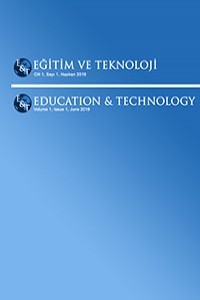Gerçekçi Matematik Eğitimi Üzerine Bir Kuramsal Çalışma
Gerçekçi Matematik Eğitimi, Matematikleştirme, ders planı
A Theoretical Study on Realistic Mathematics Education
___
- Adendorff, S. A. (2019). International reflections on Realistic Mathematics Education, International Reflections on the Netherlands Didactics of Mathematics: Visions on and Experiences with Realistic Mathematics Education, Marja van den Heuvel-Panhuizen (Ed.): book review. Pythagoras, 40(1), 1-3.
- Altun, M. (2005). İlköğretim ikinci kademede (6.,7. ve 8. Sınıflarda) matematik öğretimi. İstanbul: Alfa Basım Yayım Dağıtım.
- Altun, M. (2006). Matematik öğretiminde gelişmeler. Uludağ Üniversitesi Eğitim Fakültesi Dergisi, 19(2), 223-238.
- Anwar, L., Budayasa, I. K., Amin, S. M., & de Haan, D. (2012). Eliciting Mathematical Thinking of Students through Realistic Mathematics Education. Indonesian Mathematical Society Journal on Mathematics Education, 3(1), 55-70.
- Bintaş, J., Altun, M., & Arslan, K. (2003). Gerçekçi matematik eğitimi ile simetri öğretimi. Matematikçiler Derneği, 17.10.2019 tarihinde http://www.matder.org.tr/Default.asp?id=107 adresinden alınmıştır.
- Cobb, P., & Yackel, E. (1996). Constructivist, emergent, and sociocultural perspectives in the context of developmental research. Educational psychologist, 31(3-4), 175-190.
- Cobb, P., Yackel, E., & Wood, T. (1992). A constructivist alternative to the representational view of mind in mathematics education. Journal for research in mathematics education, 23(1), 2-33.
- Çilingir, E. (2015). Gerçekçi matematik eğitimi yaklaşımının ilkokul öğrencilerinin görsel matematik okuryazarlığı düzeyine ve problem çözme becerilerine etkisi. Yüksek Lisans Tezi, Çukurova Üniversitesi Sosyal Bilimler Enstitüsü, Adana.
- Demirdöğen, N. (2007). Gerçekçi matematik eğitimi yönteminin ilköğretim 6. sınıflarda kesir kavramının öğretimine etkisi. Yayınlanmamış yüksek lisans tezi, Gazi Üniversitesi, Eğitim Bilimleri Enstitüsü, Ankara, Türkiye.
- Dickinson, P., & Hough, S. (2012). Using realistic mathematics education in UK classrooms. Centre for Mathematics Education, Manchester Metropolitan University, Manchester, UK.
- Ernest, P. (1998). Social constructivism as a philosophy of mathematics, Albany, New York: Suny Press.
- Fauzan, A. (2002). Applying Realistic Mathematics Education(RME) in teaching geometry in Indonesian primary schools. Doctoral Dissertation, Thesis University of Twente, Enschede.
- Fauziah, A., & Putri, R. I. I. (2017). Primary school student teachers’ perception to Pendidikan Matematika Realistik Indonesia (PMRI) Instruction. In Journal of Physics Conference Series (Vol. 943, pp. 1-8).
- Göğün, Y. (2009). İlköğretim matematik 6. Sınıf öğretmen kitabı. Ankara: Özgün Matbaacılık.
- Gravemeijer, K. (1994). Developing Realistic Mathematics Education. Freudenthal Institute, Utrecht University, The Netherlands,
- Gravemeijer, K. (2011-October). Helping students construct more formal mathematics. Online Proceedings of the 3rd International Realistic Mathematics Education Conference.
- Gravemeijer, K., & Doorman, M. (1999). Context problems in realistic mathematics education: A calculus course as an example. Educational studies in mathematics, 39(1-3), 111-129.
- Gür, H. (2006). Matematik öğretimi. İstanbul: Lisans Yayıncılık
- Inharjanto, A., & Lisnani, L. (2019, April). Implementing Realistic Mathematics Education for Elementary Schools in Indonesia. In International Conference on Educational Sciences and Teacher Profession (ICETeP 2018) (pp. 188-191). Atlantis Press.
- Lange, J. de (1996). Using and Applying Mathematics in Education. in: A.J. Bishop, et al. (eds). 1996. International handbook of mathematics education, Part one. 49-97. Kluwer academic publisher.
- Lange, J. de (1995). Assessment: No Change without Problems, in: Romberg, T.A. (eds). (1995). Reform in School Mathematics and Authentic Assessment. New York, Sunny Press, 87-172.
- Majewska, D. (2019). Horizontal and vertical mathematising. https://www.cambridgemaths.org/Images/espresso_18_using_realistic_contexts_in_mathematics.pdf
- Nieveen, N. (1999). Prototyping to reach product quality. In Design approaches and tools in education and training (pp. 125-135). Springer, Dordrecht.
- Özdemir, E., & Üzel, Ü. (2011). Gerçekçi matematik eğitiminin öğrenci başarısına etkisi ve öğretime yönelik öğrenci görüşleri. Hacettepe Üniversitesi Eğitim Fakültesi Dergisi, 40, 332-343
- Rabbani, S., & Muftianti, A. (2020). Implementation of teaching materials using a realistic mathematics education approach in primary student mathematics communication. PrimaryEdu-Journal of Primary Education, 4(2), 230-240.
- Streefland, L. (1991). Fractions in realistic mathematics education: A paradigm of developmental research (Vol. 8). Springer Science & Business Media.
- Treffers, A. (1987). Integrated column arithmetic according to progressive schematisation. Educational studies in Mathematics, 18(2), 125-145.
- Ünal, Z. A., & İpek, A. S. (2009). Gerçekçi matematik eğitiminin ilköğretim 7.sınıf öğrencilerinin tam sayılarla çarpma konusundaki başarılarına etkisi. Eğitim ve Bilim, 34(152), 60-70.
- Van Den Heuvel-Panhuizen, M. (2003). The didactical use of models in realistic mathematics education: An example from a longitudinal trajectory on percentage. Educational studies in Mathematics, 54(1), 9-35.
- Van den Heuvel-Panhuizen, M. H. A. M. (1996). Assessment and realistic mathematics education (Vol. 19). Utrecht University.
- Van den Heuvel-Panhuizen, M., & Drijvers, P. (2014). Realistic Mathematics Education. S. Lerman (ed.), Encyclopedia of Mathematics Education, DOI 10.1007/978-94-007-4978-8, Springer Science, Business Media Dordrecht.
- Wahyudi, M., Joharman, M., & Ngatman, M. (2017, October). The Development of Realistic Mathematics Education (RME) for Primary Schools' Prospective Teachers. In International Conference on Teacher Training and Education 2017 (ICTTE 2017). Atlantis Press.
- Wubbels, T., Korthagen, F., & Broekman, H., (1997). Preparing teachers for realistic mathematics education. Kluwer Academic Publishers, The Netherland Educational Studies in Mathematics, 54, 9-35)
- Zulkardi, Z. (1999). How to Design Mathematics Lessons Based on the Realistic Approach? 26.01.2019, http://eprints.unsri.ac.id.
- Zulkardi, P. (2002). Developing a Learning Environment on Realistic Mathematics Education for Indonesian Student Teachers. Thesis University of Twente, Enschede.
- ISSN: 2687-3931
- Başlangıç: 2019
- Yayıncı: Mehmet Hayri SARI
Okul Müdürlerinin Paternalist Liderlik Davranışlarının Örgütsel Mutluluğa Etkisi
Mustafa ÖZGENEL, Rifat CANUYLASİ
Değer Yönelimlerine İlişkin Faktörlere Yönelik Sınıf Öğretmenleri Üzerine Bir Uygulama
Suadiye YEŞİLTEPE, Berna KORUCUK
Gerçekçi Matematik Eğitimi Üzerine Bir Kuramsal Çalışma
COVID-19 Sürecinde Özel Yetenekli Öğrencilerin Uzaktan Eğitiminde Öğretmenlerin Teknoloji Kullanımı
